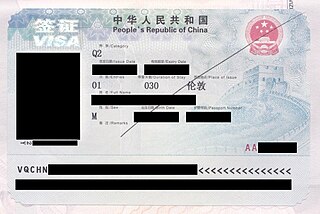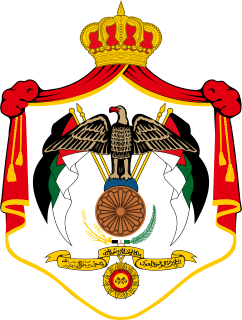Related Research Articles

A visa is a conditional authorization granted by a polity to a foreigner that allows them to enter, remain within, or to leave its territory. Visas typically include limits on the duration of the foreigner's stay, areas within the country they may enter, the dates they may enter, the number of permitted visits, or if the individual has the ability to work in the country in question. Visas are associated with the request for permission to enter a territory and thus are, in most countries, distinct from actual formal permission for an alien to enter and remain in the country. In each instance, a visa is subject to entry permission by an immigration official at the time of actual entry and can be revoked at any time. Visa evidence most commonly takes the form of a sticker endorsed in the applicant's passport or other travel document but may also exist electronically. Some countries no longer issue physical visa evidence, instead recording details only in immigration databases.

The Australian migration zone is a legal device created by the Australian government for the purpose of Australia's visa policy and immigration policy, as the territory in which Australia’s visa policy applies. The Australian migration zone covers such Australian controlled territories as the government may determine. Prior to 2001, the Australian migration zone consisted of the mainland, and some external territories. Norfolk Island, for example, was not part of the Australian migration zone until 2016. Under Australia’s universal visa policy, a non-citizen must hold an Australian visa within the Australian migration zone. Without such a visa, or a bridging visa, the non-citizen is an unlawful non-citizen and treated as an "unauthorised arrival". However, the main impact of the migration zone is that unauthorised arrivals outside the zone have very limited access for review by Australian courts.
Freedom of movement, mobility rights, or the right to travel is a human rights concept encompassing the right of individuals to travel from place to place within the territory of a country, and to leave the country and return to it. The right includes not only visiting places, but changing the place where the individual resides or works.

The Common Travel Area is an open borders area comprising the United Kingdom, Ireland, Isle of Man, and the Channel Islands. The British Overseas Territories are not included. Based on agreements that are not legally binding, the internal borders of the CTA are subject to minimal controls and can normally be traversed by British and Irish citizens with minimal identity documents. The maintenance of the CTA involves co-operation on immigration matters between the British and Irish authorities.

The Trans-Tasman Travel Arrangement (TTTA) is an arrangement between Australia and New Zealand which allows for the free movement of citizens of one of these countries to the other. The arrangement came into effect in 1973, and allows citizens of each country to reside and work in the other country, with some restrictions. Other details of the arrangement have varied over time. From 1 July 1981, all people entering Australia have been required to carry a passport. Since 1 September 1994 Australia has had a universal visa requirement, and to specifically cater for the continued free movement of New Zealanders to Australia the Special Category Visa was introduced for New Zealanders.
A Special Category Visa (SCV) is an Australian visa category granted to most New Zealand citizens on arrival in Australia, enabling them to visit, study, stay and work in Australia indefinitely under the Trans-Tasman Travel Arrangement. Currently, there are two categories of SCVs: protected SCV and as non-protected SCV. New Zealanders who had entered Australia before 26 February 2001 are classified as protected SCV holders, and after that date as non-protected SCV holders. The rights of the two categories are somewhat different.

The visa policy of Australia deals with the requirements that a foreign national wishing to enter Australia must meet to obtain a visa, which is a permit to travel, to enter and remain in the country. A visa may also entitle the visa holder to other privileges, such as a right to work, study, etc. and may be subject to conditions.

The visa policy of the United States consists of the requirements for foreign nationals to travel to, enter, and remain in the United States. Visitors to the United States must obtain a visa from one of the U.S. diplomatic missions unless they come from one of the visa-exempt or Visa Waiver Program countries. The same rules apply for travel to all U.S. states, Washington, D.C., Puerto Rico and the U.S. Virgin Islands, as well as to Guam and the Northern Mariana Islands with additional waivers, while similar but separate rules apply to American Samoa.

A travel document is an identity document issued by a government or international entity pursuant to international agreements to enable individuals to clear border control measures. Travel documents usually assure other governments that the bearer may return to the issuing country, and are often issued in booklet form to allow other governments to place visas as well as entry and exit stamps into them. The most common travel document is a passport, which usually gives the bearer more privileges like visa-free access to certain countries. While passports issued by governments are the most common variety of travel document, many states and international organisations issue other varieties of travel documents that the holder to travel internationally to countries that recognise the documents. For example, stateless persons are not normally issued a national passport, but may be able to obtain a refugee travel document or the earlier "Nansen passport" which enables them to travel to countries which recognise the document, and sometimes to return to the issuing country.

The visa policy of the Schengen Area is set by the European Union and applies to the Schengen Area and to other EU member states except Ireland. The visa policy allows nationals of certain countries to enter the Schengen Area via air, land or sea without a visa for stays of up to 90 days within a 180-day period. Nationals of certain other countries are required to have a visa either upon arrival or in transit.

Visitors to the mainland of the People's Republic of China must obtain a visa from one of the Chinese diplomatic missions, unless they come from one of the visa exempt countries. The two Special Administrative Regions – Hong Kong and Macau – maintain their own independent border control policies and thus have their own separate visa requirements.
The visa policy of Canada requires that any foreign national wishing to enter Canada must obtain a temporary resident visa from one of the Canadian diplomatic missions unless they hold a passport issued by one of the 54 eligible visa exempt countries and territories or proof of permanent residence in the United States.

The visa policy of Jordan deals with the requirements which a foreign national wishing to enter Jordan must meet to be permitted to travel to, enter and remain in the country.

The visa policy of the United Kingdom is the policy by which Her Majesty's Government determines visa requirements for visitors to the United Kingdom, and the Crown dependencies of Guernsey, Jersey, and the Isle of Man and those seeking to work, study or reside there. All intended entrants must obtain a visa unless they are exempt.

The visa policy of Ireland is set by the Government of Ireland and determines visa requirements for foreign citizens. If someone other than a European Union, European Economic Area, Common Travel Area or Swiss citizen seeks entry to Ireland, they must be a national of a visa-exempt country or have a valid Irish visa issued by one of the Irish diplomatic missions around the world.

Overseas Citizenship of India (OCI) is a form of permanent residency available to people of Indian origin and their spouses which allows them to live and work in India indefinitely. Despite the name, OCI status is not citizenship and does not grant the right to vote in Indian elections or hold public office. The Indian government can revoke OCI status in a wide variety of circumstances. As of 2020, there are 6 million holders of OCI cards among the Indian Overseas diaspora.

Visitors to Thailand must obtain a visa from one of the Thai diplomatic missions unless they come from a visa-exempt country or a country whose citizens are eligible to obtain visas on arrival.

Non–New Zealand citizens wishing to enter the Realm of New Zealand must obtain a visa unless they are

Visitors to Cuba must obtain a visa before travel or a tourist card from one of the Cuban diplomatic missions, travel agencies or authorized airlines unless they come from one of the visa exempt countries.

The Migration Act 1958 is an Act of the Parliament of Australia that governs immigration to Australia. It set up Australia’s universal visa system. Its long title is "An Act relating to the entry into, and presence in, Australia of aliens, and the departure or deportation from Australia of aliens and certain other persons."
References
- ↑ "Migration Act 1958, taking into account amendments up to Migration Amendment (Temporary Sponsored Visas) Act 2013". Australian Government - ComLaw. Retrieved 25 September 2013.
- ↑ "Migration Regulations 1994, taking into account amendments up to Migration Amendment (Visa Application Charge) Regulation 2013". Australian Government - ComLaw. Retrieved 25 September 2013.